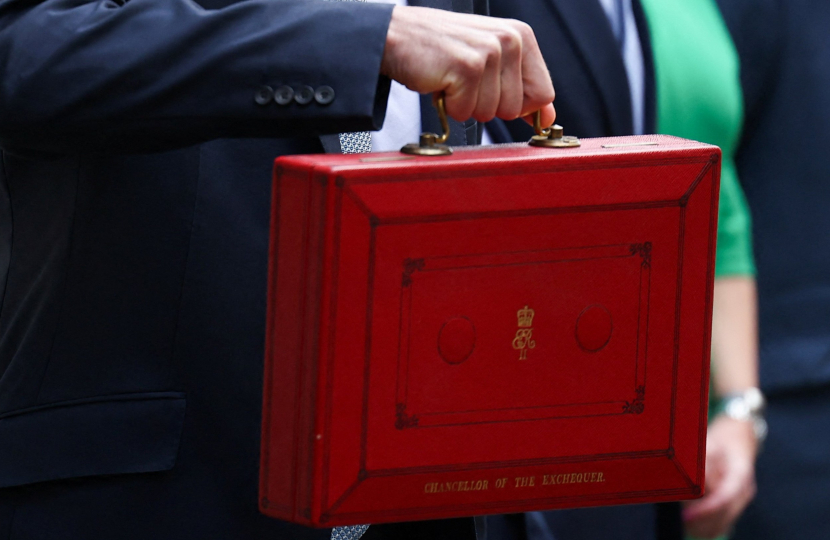
Stephen Metcalfe, MP for South Basildon & East Thurrock, has welcomed the Chancellor of the Exchequer’s Spring Budget which cuts National Insurance by another 2% (cutting tax by £900 for the average worker).
The Government’s 2023 Autumn Statement and 2024 Spring Budget have now cut National Insurance Contributions by 4%. This means that the average worker on £35,400 will now keep £900 more of their hard-earned cash. In total, this National Insurance tax cut will boost 27 million workers, including 2.8 million workers in Eastern England.
Stephen Metcalfe MP said: “Keeping taxes down matters to Conservatives. I will always support taxpayers keeping more of their own hard-earned cash, so I am very pleased to see another 2% decrease in National Insurance contributions in the Budget.
As a result of this Budget, the average earner will have the lowest effective tax rate since 1975 and the lowest effective tax rate than any other G7 economy, including the US which is known for its low-tax credentials. This is a great fact.”
The Spring Budget has also delivered for the 2 million Brits who are self-employed by cutting the main rate of Class 4 National Insurance Contributions from 9% to 6%. Combined with the tax cuts from the Autumn Statement, this is a boost of around £650 for the average self-employed person on £28,000.
The Chancellor has also announced transformational reform to the Child Benefit system. The unfairness of the £50,000 single-income threshold has been recognised and the Government will be bringing forward plans to move Child Benefit to a household-based system by 2026. Whilst this is being formulated with HMRC, the Government will move the threshold to £60,000, boosting more than 500,000 families by £1,300.
These tax cuts are possible due to a solid financial backdrop. The Government has been working with the Bank of England to put sound money first. Headline debt is projected to fall every year and borrowing is at the lowest level since 2001. The UK economy has turned the corner on inflation and will soon turn the corner on growth. Greenfield foreign direct investment remains the highest in Europe and third highest in the world after the US and China. This reflects the UK’s attractiveness to investors and the economy’s potential for growth.
Stephen said: “The last few years have not been easy, with the legacy of Covid, war in Ukraine and war in the Middle East. However, the UK economy’s foundations are strong and there is a positive outlook. We remain the biggest entertainment sector in Europe, the biggest tech sector in Europe, and we have more unicorn startups than France and Germany combined. This Budget builds on these successes.”
The entertainment industry is a big winner from the Budget. The UK film industry is expanding rapidly and studio space has doubled in the last 3 years. In fact, it will soon be second only to Hollywood. To boost this success, Audio-Visual Expenditure Credit will rise by 5% to 39%, a new tax relief will be created for the production of independent UK films, and tax relief for orchestras and theatres will become permanent at 45%.
Other measures announced in the Budget include the 14th consecutive freeze in fuel duty. This is good for drivers, truckers, and sole traders – saving millions in extra tax. if the Chancellor had done nothing, fuel duty would have risen by 13%. This win for motorists comes as other parties adopt increasingly anti-motorist policies.
The Budget also included support for pubs, clubs and venues in Essex which will benefit from another freeze in alcohol duty – alleviating pressure on the hospitality industry. If the Chancellor had done nothing, alcohol duty would have risen by 3%. Small businesses in Essex will also welcome the news that the VAT threshold has been raised from £85,000 to £90,000. This will mean the UK’s VAT registration threshold will be the highest across the EU and the highest in the OECD alongside Switzerland.
Finally, the NHS received further investment as it continues to recover following the pandemic. In this Budget, the Chancellor announced an additional £2.45 billion next year to make progress on getting waiting lists down – growing NHS funding in real terms. To improve NHS productivity and slash 13 million wasted hours on outdated IT systems, the Government has also unveiled a £3.4 billion NHS Productivity Plan. This will modernise IT systems, introduce AI form filling, improve CT and MRI operations, and fund upgrades to the NHS app. In all, the chief of NHS England has said that these plans will increase NHS productivity by 2% year-on-year.
Stephen Metcalfe said: “This Budget has covered a lot. It goes back to the core principles – solid financial management, supporting solid growth and ensuring taxpayers keep more of their money.
I am particularly pleased about the £3.4 billion injection to improve NHS productivity, with new IT systems, increased use of AI, and improvements to the fluidity of the NHS app. I look forward to seeing the results locally.”


